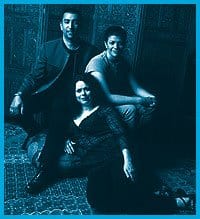There’s a revolution underway, and for DJ and activist Zahra Dhanani, the evidence is on the dancefloor.
At FunkAsia, her monthly South Asian club night, Dhanani sees a “multifaith, multi-gendered, multi-sexual collaboration. There are people of all religious and ethnic backgrounds coming together to have a good time. And most significantly, there are straight people, many with religious backgrounds, who are, for the first time, meeting and hanging out with queer people. And do you know what? All those people might not always agree with each other, but they respect each other and respect each other’s differences. And that is revolutionary.”
Dhanani is looking forward to seeing some of that revolutionary spirit at Toronto’s international conference for gay, lesbian, bisexual, transgendered and transsexual Muslims to be held Jun 20 to 22, where she will be performing.
The event is co-sponsored by Toronto’s queer Muslim group Salaam (which also has chapters in Halifax and Vancouver) and the US lesbian, gay, bi and trans Muslim group Al-Fatiha. The fourth event of its kind, this time around it is exploring the theme “Liberating Tradition, Celebrating Culture” through a variety of workshops on topics ranging from liberation theology and Sufism to human rights and healthy sexuality. Some 200 participants from around the world are expected to attend.
“It will be both a revisiting and a celebration of what it means to be Muslim,” says El-Farouk Khaki, a Toronto lawyer and one of the conference organizers.
The conference offers a much more open image than “the mostly unidimensional view of Islam that’s held in the West,” says Dhanani, where Muslims are usually seen as terrorists, fundamentalists or both.
“The truth is,” Khaki says, “the fundamentalists don’t represent the majority of Muslims. But a lot of moderate and progressive Muslims feel pushed to the side and shut out of the mosques.”
For most queer Muslims, being open within their communities has been an enormous challenge. Not only do they fear rejection from their families, but from their broader communities.
“Homosexuals cannot be Muslims,” blasts one recent on-line debate on the topic. When a chapter of Al-Fatiha was founded in England three years ago, the head of one fundamentalist group issued a fatwa, a religious ruling, denouncing Al-Fatiha members as traitors. “Never will such a group be tolerated in Islam,” he told followers.
In some Muslim-majority countries, like Saudi Arabia, homosexuality is punishable by death, while in Egypt, there’s been a recent spate of arrests of “perceived homosexuals.” Some have been convicted for having on-line conversations in gay chatrooms, and, most notoriously, this year, 12 men were sentenced to three years in prison for the “habitual practice of debauchery” after being arrested on a gay boat cruise on the Nile River.
Scott Siraj Kugle, a professor of religion at Swarthmore College in Pennsylvania, who will be discussing spirituality and sexuality at the conference, says that the struggle for queer Muslims will get harder before it gets easier.
“As more and more of us speak out and come out, we are harder to ignore and opposition will be more virulent. But I don’t think that backlash will last long. I think what we’re really experiencing now is a groundswell of moderate and progressive Muslims speaking out in their communities,” says Kugle.
For Kugle, the path to liberation lies in liberating Islamic theology itself – something that is very new for Muslims. “So many of us are afraid of the Koran because for so long it’s been used against us. For a long time, Muslim feminists and gay activists took a secular route and avoided the Koran altogether because they didn’t feel it could be anything but oppressive. But there’s a new generation of Muslim feminists, particularly in Morocco, South Africa and Iran, who are engaging with the Koran and seeing that there are new ways to interpret it. And when you read the Koran, you realize that far from condemning us, it actually offers a lot of resources on how to live sincerely within our faith as gay and lesbian. For instance, the Koran is full of really interesting stories about rebellion.”
Though there is not a large focus on homosexuality in the Koran, Kugle says “the traditional interpretations of the Koran make some conclusions about homosexual acts that are condemning, but I’m not sure that those are accurate and correct interpretations. There’s not even a word for homosexuality or homosexual in the Koran.”
He points to the story of Lot and Sodom and Gomorrah, which has been used as well in Christianity and Judaism to denounce homosexuality. “But some scholars, like myself, interpret that as a condemnation of rape, not of homosexuals.”
Adds Dhanani, “You have to remember that the Koran was not written by the Prophet Mohammed, but by people who would have been influenced by the culture and traditions of their time. Some of that just doesn’t work for the times we are now living in.
“For instance, there are references in the Koran about how to treat your horses and your cattle. That’s just not relevant to the majority of Muslims today and so people don’t fixate on whether people are treating their horses properly in accordance with the Koran.Most of the people who want to follow the Koran literally, only want to follow part of it literally.
“What people forget is that culture is not static. And our traditions have to keep up with changes in our culture. Many things that have simply been traditions – which are subject to change as culture changes – are seen as religious doctrine.”
Until recently, Christians and Jews were the only major religious groups visible and active in queer issues and fighting for recognition within their faith communities. Many gay and lesbian Muslims felt stuck with the painful choice of either hiding or denying their sexuality, or abandoning their faith. In the last decade, however, queer Muslims have taken great steps out of the closet. Salaam now has chapters in Halifax and Vancouver, as well as Toronto, while Al-Fatiha, its sister organization has nine chapters in the US, as well as affiliate groups in Britain and South Africa. Khaki says this growth and empowerment owes its emergence to a number of factors. One of the most significant is the Internet.
“Once people got on-line and started talking,” he says, “things really began to change. Suddenly all these people who felt isolated in their local communities realized they weren’t alone.” Websites like Queerjihad.org and Salaamtoronto.com offer gay and lesbian Muslims a global community in which to come out. Al-Fatiha, itself, was created in 1997 out of a listserv e-mail list.
The aftermath of 9/11, a topic that will be discussed at the conference, has been another significant factor.
“With all the tragedy and suffering that came with 9/11, one good thing that emerged was that progressive Muslims began the process of reclaiming a faith that had been hijacked by fundamentalists,” Kugle says.
Adds Khaki: “Sep 11 forced progressive and moderate Muslims into the spotlight. First of all, there were many people who led completely secular lives who suddenly were being identified by their religion and who had to come to terms with that. Then there were many people who felt silenced and pushed to the sidelines who felt compelled to speak out. All of a sudden it was possible and necessary within the Muslim community to raise alternative views. There was a blossoming of a global progressive Muslim movement and queer Muslims were a part of that.”
Another factor, particularly for Muslims in Canada, has been the advancement of gay and lesbian rights.
“We are, overall, more accepted and more secure. That legitimacy makes it more difficult for people to hate us. As more queers come out publicly, it makes it much harder for people in the Muslim community to exclude or condemn us,” says Khaki.
Khaki points to a recent panel discussion that Salaam held at the 519 Community Centre. “There was a straight woman on the panel in a hijab. That wouldn’t have happened 10 years ago. A religious straight woman would probably have not wanted to associate herself with us. Now it’s less of a problem.”
Dhanani says that changes to Canada’s refugee laws, which now allow people to claim persecution due to sexual orientation have also been significant.
“There’s been an influx of gay and lesbian refugees from Muslim countries who have been persecuted for their sexuality. Many of them are becoming politically active here. The flip side of that is that there is also a generation of people, like me, who are immigrated here as children, or who are first generation. We have now come of age. We feel secure here. We know our rights as Canadians and as queers. And we feel more comfortable coming out.”
* The Salaam Canada/Al-Fatiha International Conference takes place Fri, Jun 20 to 22. There are some spaces for last minute registration. The form’s at www.salaamtoronto.com or e-mail salaam@salaamcanada.com.


 Why you can trust Xtra
Why you can trust Xtra


